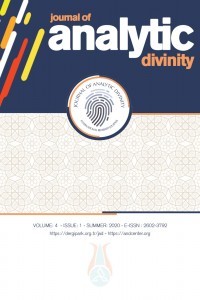
Journal of Analytic Divinity
Yazarlar: Tahsin YURTTAŞ
Konular:Din Bilimi
DOI:10.46595/jad.740903
Anahtar Kelimeler:İcmâ,Grammar,Method,Evidence.
Özet: In this article, icmâ case which is an evidence of a nahiv method will be mentioned. According to this, the definition of icmâ, its types and its source value will be examined. In addition, the emergence of icmâ in nahiv issues and schools will be examined and examples of some nahiv issues that are allied will be given. The main sources of the method of Nahiv are named as the proofs of this science. These proofs are the foundations on which the river is based and constitute this science. The primary evidences of the method of Nahiv are: Sema, kıyas, icmâ, istishâb. These are regarded as the primary proofs of the Arab nahiv. Apart from these, istihsan, istidlâl, beyanu’l-ille, etc. There is also evidence that is accepted secondaryly and mentioned mostly by Ibn Cinnî (ö. 392/1002). İcmâ is one of the primary evidences used in determining and grounding the river. In the tradition of Arabic linguistics, icmâ is considered as evidence in terms of nahiv style and opposition to it is not deemed appropriate by the majority linguists. Icmâ was mostly seen in the linguistic schools between Basra and Kufah and within themselves, and the views that they allied on these schools were accepted in the following centuries.